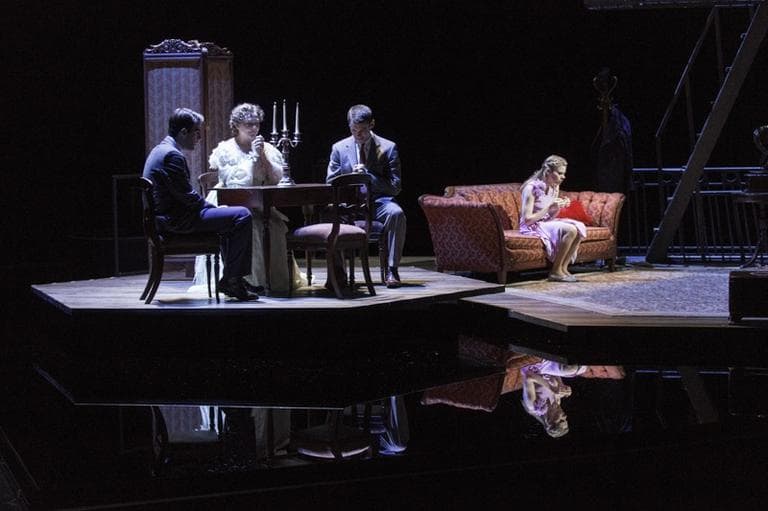Advertisement
A 'Glass Menagerie' To Build A Dream On

Who knew that black goo could be so beautiful? And who figured that the American Repertory Theater’s first production of a Tennessee Williams play, “The Glass Menagerie,” would be so extraordinary?
The A.R.T. production, in Tennessee Williams's words, doesn't go to the moon. It goes much further.
We are obviously within the mind of Tom, the narrator, recalling the events of living with an overbearing mother and painfully shy sister in a cramped apartment, and even that is being too literal. As Williams says,
“The scene is memory and is therefore nonrealistic. Memory takes a lot of poetic license. It omits some details; others are exaggerated, according to the emotional value of the articles it touches, for memory is seated predominantly in the heart. The interior is therefore rather dim and poetic.”
That’s the important stage direction and Tiffany’s direction is as poetic as Williams’s instructions. The actors move about the stage with a rough-hued grace. (Steven Hoggett is in charge of movement.). Cherry Jones as Amanda, the mother, flits about the stage trying to summon an ancient charm; Brian J. Smith as the Gentleman Caller has the most self-assured bearing, though it’s his more hesitant moves that let you know all is not so perfect in his power-of-positive-thinking world; Celia Keenan-Bolger combines the elfin and simian beautifully in Laura, her pain palpable in every awkward step.
It’s Zachary Quinto, though, who commands this stage, which is only fitting considering it’s his character’s play. He makes you feel Tom’s desperation, his need to get out of the house and go to the movies and then to forget about the movies and light out for the territories. Hitting his friend with a newspaper, shoveling his mother’s food into his mouth, or merely putting his hands in his pockets, Quinto makes every gesture count toward the realization that he has to find an alternative to his soul-killing life, both at home and at the warehouse where he works with the Gentleman Caller, “the long delayed but always expected something that we live for.”
Jones walks a fine line between the exaggerated monster of Tom’s imagination and her own professed desire to make Amanda a sympathetic character, doing almost everything in the play for Laura’s benefit. The two aren’t mutually exclusive, though there’s more than a little payback in Williams’s recollections of his own mommie dearest and Jones sometimes seems uncomfortable at the outer edges of the character. Still, Williams was too good a playwright to make her a Gothic caricature and Jones seizes the openings he left to ennoble Amanda’s sacrifices.
This may be the first A.R.T. Williams production (at the Loeb Drama Center, through March 17), but it isn’t the first “Glass Menagerie” at A.R.T. Rob Orchard, now at ArtsEmerson, brought a very good Hartford Stage production to the Loeb. It was a fine blend of representational and nonrepresentational theater, leaning more toward naturalism.
In a way, this is old school A.R.T., leaning more toward the theater of dreams, a school that doesn’t ordinarily include Williams. Tiffany, though, lets you see that he’s a card-carrying member. That doesn’t mean there’s anything at all avant-garde about the production. Tiffany simply brings all the kinetic elements of stagecraft together to make this such a fully-realized, heart-rending production.
It’s the best production in the Boston area of 2013. It’s early days, but we might be saying the same thing next December. Tiffany workshopped his production of the musical, “Once,” at A.R.T. before it became such a hot ticket in New York. Maybe Diane Paulus can convince the producers to come back when the run is over there?
In the meantime, Tiffany gives us a “Glass Menagerie” to remember.
And keep your eyes on that couch.
This program aired on February 7, 2013. The audio for this program is not available.

